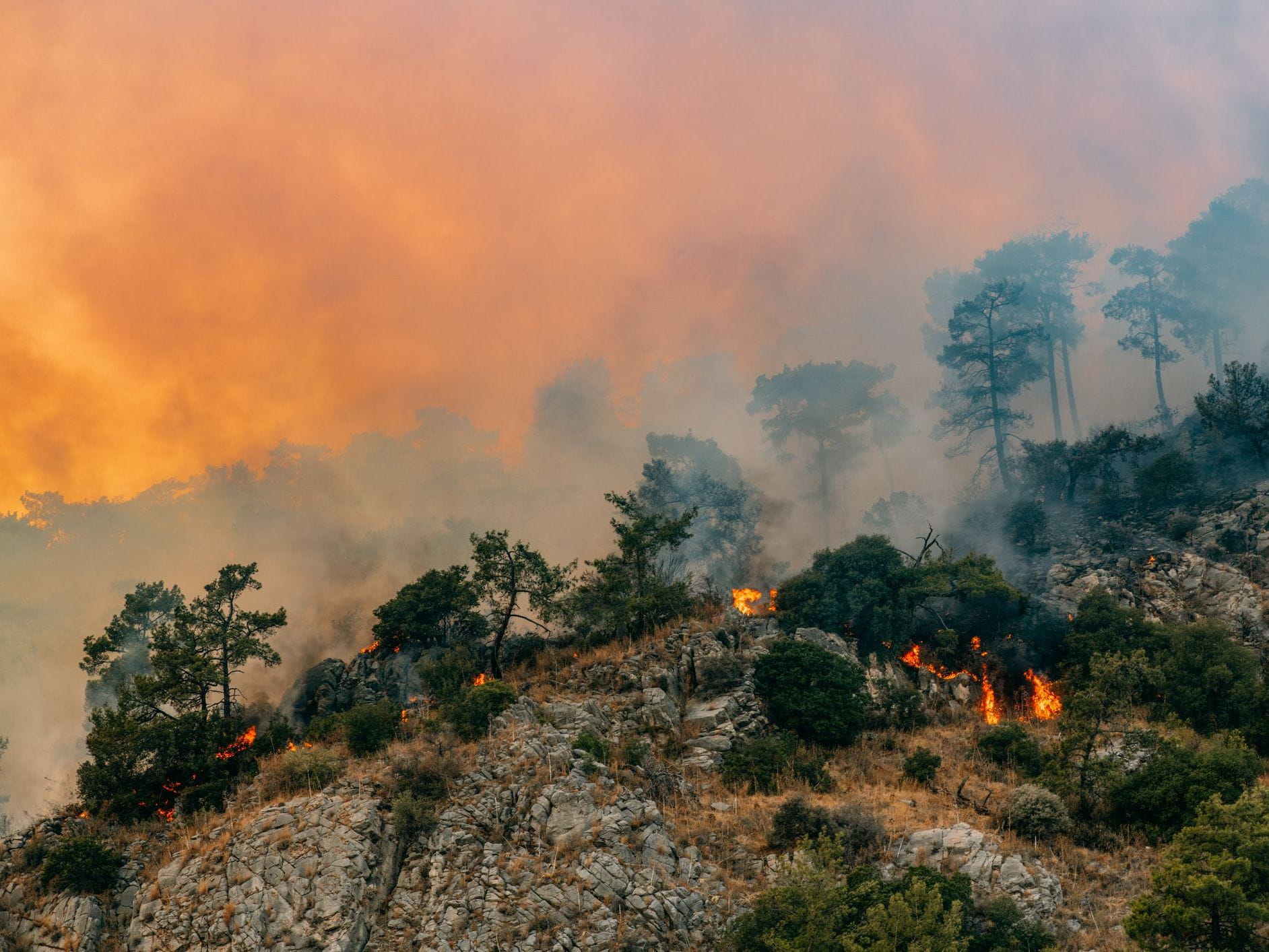Protecting Yourself from Wildfire Smoke

The Bottom Line
Wildfire smoke contains fine particles that can be inhaled into the lungs or irritate your eyes. Wildfire smoke can cause respiratory problems ranging from a runny nose and slight cough to wheezing, difficulty breathing, and bronchitis. Some people experience cardiac effects, especially those with underlying heart problems. Smoke can travel long distances and persist for a long time.

Is wildfire smoke toxic?
Yes, wildfire smoke is toxic. It contains fine particles that can be inhaled deep into the lungs and get into your eyes. The small particles can sometimes be absorbed into the blood stream from the lungs. The particles are a mixture of solid and liquid droplets that are suspended in the air. Other gases such as carbon monoxide, carbon dioxide, nitrogen oxides, and volatile chemicals such as hydrocarbons are often present.Symptoms of wildfire smoke inhalation
Wildfire smoke inhalation can cause respiratory problems. Inhaling the fine particulate can cause irritation of the nose and throat, leading to a runny nose and coughing. This can also lead to irritation and inflammation of the respiratory system.When small particles are inhaled into the lungs, coughing, wheezing, difficulty breathing, and bronchitis can occur. This can also trigger an asthma attack and cause cardiac problems including abnormal heart rhythms, increase in blood pressure, heart failure, heart attacks, and stroke. This is especially an issue for people with underlying cardiovascular problems. When the fine particles get into the eyes, they can cause a burning sensation and eye irritation.
How far can wildfire smoke travel?
The distance wildfire smoke travels depends on the size of the wildfire. If it is small, it will mostly affect the area in its immediate vicinity. In instances of a large wildfire, the smoke can travel thousands of miles. The wind can lift the smoke up into the stratosphere and then, as the smoke cools and descends, it can sometimes reach areas far from the wildfire itself.How long does it take for wildfire smoke to clear?
It can take days, weeks, or months for wildfire smoke to clear. This depends on the size of the fire, the weather, the height of the fire in the atmosphere, and the landscape around the fire. The larger the fire, the longer it will take to clear. Wind can also increase the time it takes for the wildfire to clear, while rain can decrease it. If the particles are higher in the atmosphere, they will also take longer to clear. If the landscape has mountains, the amount of smoke in the valley and on the mountain may vary.Wildfire smoke exposure during pregnancy: Is it safe?
No, wildfire exposure during pregnancy is not safe. Wildfire smoke exposure during pregnancy is associated with premature births and lower birth weights. Wildfire smoke is also dangerous for babies, as they have a faster respiratory rate and smaller airways than adults. This means that babies are at a higher risk of developing respiratory symptoms.How to protect yourself from wildfire smoke
If you live in a community where wildfires are known to occur, prepare for evacuation so that you know what to take with you, where to go, and where you can stay. Listen for emergency alerts to find out if you should evacuate. If you are instructed to stay at home and remain indoors, keep windows and doors closed. Close any vents that vent outside the house. Use fans and air conditioners in the home. If available, use a portable air cleaner or high-efficiency filter.How to check the air quality near me
Air quality information is available on AirNow.gov. AirNow also features a Fire and Smoke Map, which has information about nationwide wildfire conditions and other resources relating to wildfires. Your personal devices, such as your phone or watch, may also provide local air quality information.Are you having a toxic wildfire smoke exposure?
If you are experiencing exposure to wildfire smoke, you should go inside to get away from the smoke and breathe fresh air. If your throat is irritated, drink water and suck on hard candy or cough drops. If you have a mild cough, cough medicine may help. Be sure not to smoke and or let anyone smoke around you. Rinse your eyes with water if they are irritated.If someone inhales wildfire smoke, gets wildfire smoke in the eyes, or if you have a question about wildfire safety, get help from Poison Control by phone at 1-800-222-1222. Poison Control’s expert guidance is always free, confidential, and available 24 hours a day.
Wendy Klein-Schwartz, Pharm.D., MPH
Clinical Toxicologist
Poison Control Media Information
Did you find this page helpful? If so, we need your support. Poison Control is in constant competition with misinformation online. Links to www.poison.org or our webPOISONCONTROL triage tool from other websites and blogs help internet searchers quickly find accurate information and Poison Control’s contact information in an emergency. If you use the content from this page, please provide attribution via a link back to this page, www.poison.org, or https://triage.webpoisoncontrol.org/#!/exclusions. By doing so, you could save a life. Thank you!
Poisoned?
Call 1-800-222-1222 or
Prevention Tips
If your area is being impact by wildfire smoke, consider the following:
- Be prepared to either evacuate or remain in your home depending on your local emergency alert recommendation.
- Be sure to monitor air quality levels.
- Keep indoor air as clean as you can by keeping windows and doors closed and using a high efficiency particulate air filter.
- Avoid smoking.
- Avoid using a wood burning stove or fireplace.
- Avoid vacuuming, which stirs up dust.
- Reduce your time outside.
- Wear an N95 mask outside as it may provide some protection.
- Keep windows closed and air conditioning on the recirculate setting when driving.
This Really Happened
A 66-year-old man with a history of smoking and chronic respiratory disease ignored wildfire evacuation warnings. He was determined to stay to protect his house. When he was inside the house, he closed the windows and doors and turned the air conditioning on. When he was outside hosing down his house with water and moving flammable outdoor items away from the structure, he wore an N95 mask. He found it difficult to breathe with the N95 mask and so would periodically slide it down under his chin. His eyes grew irritated and began tearing up. After a few hours, he developed a headache, scratchy throat, cough, shortness of breath, and fatigue. He rinsed his eyes and drank water but still felt poor. He called Poison Control and was instructed to seek medical attention. He was evaluated in an emergency room, where he was deemed to be in moderate respiratory distress with coughing, phlegm, and wheezing, as well as elevated respirations, heart rate, and blood pressure. The oxygen in his blood was low. He was admitted and treated with inhaled oxygen, inhalation medications, and heart medications. He was discharged 24 hours later.For More Information
Why Wildfire Smoke is a Health Concern. US Environmental Protection Agency. Accessed July 29, 2024.
References
Poisoned?
Call 1-800-222-1222 or
Prevention Tips
If your area is being impact by wildfire smoke, consider the following:
- Be prepared to either evacuate or remain in your home depending on your local emergency alert recommendation.
- Be sure to monitor air quality levels.
- Keep indoor air as clean as you can by keeping windows and doors closed and using a high efficiency particulate air filter.
- Avoid smoking.
- Avoid using a wood burning stove or fireplace.
- Avoid vacuuming, which stirs up dust.
- Reduce your time outside.
- Wear an N95 mask outside as it may provide some protection.
- Keep windows closed and air conditioning on the recirculate setting when driving.
